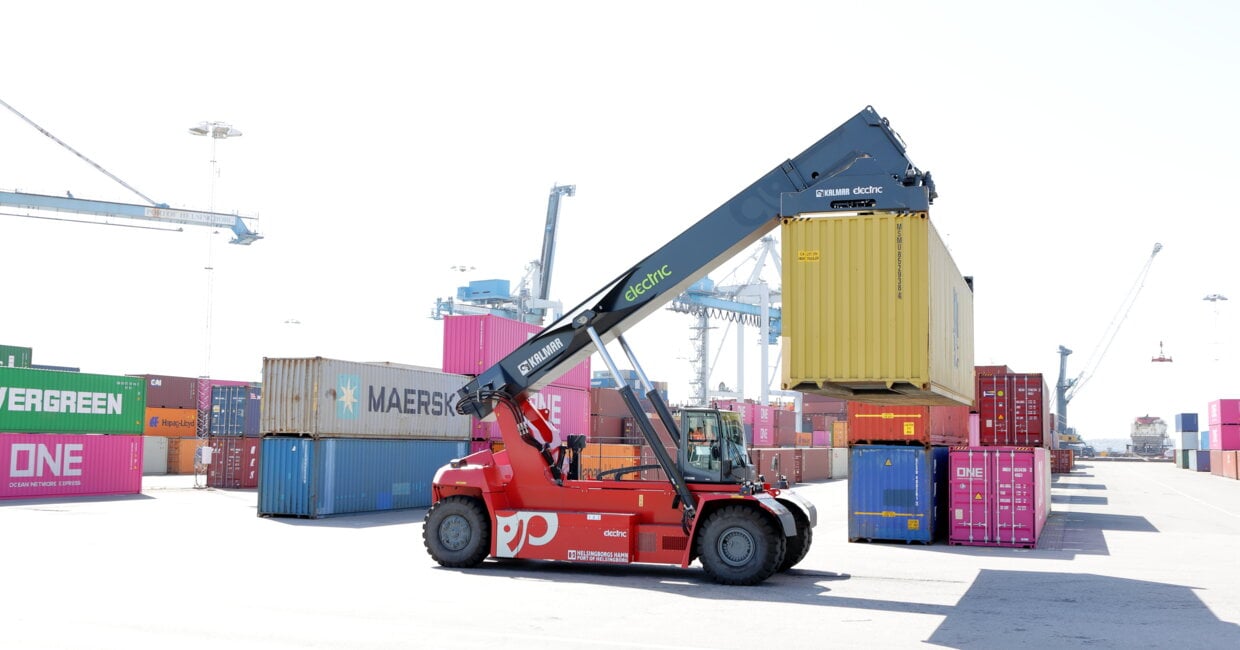
Port of Helsingborg furthers its sustainability goals with delivery of Sweden’s first electric reachstacker
Delivery of Kalmar’s Electric Reachstacker marks the port’s latest step in replacing 75% of its heavy vehicle fleet with electric alternatives by 2026.
The Port of Helsingborg is Sweden’s second-largest container port, and a logistics hub for Helsingborg, Skåne and southern Sweden, enabling the cost- and environmentally efficient transport of goods in and out of the country.
“We are really happy to receive the Kalmar Electric Reachstacker. Now we have an exciting time ahead of us to first learn and then evaluate the machine's productivity and efficiency in the terminal,” says Bart Steijaert, CEO of the Port of Helsingborg.
“We want to say congratulations to the Port of Helsingborg for leading the way in Sweden with the purchase of the first electric reachstacker,” says Eric Wass, Sales Manager, Kalmar Sweden.
Supporting Helsingborg’s sustainable vision
Helsingborg’s port strives to be the most modern in the Nordic region, with the smallest possible environmental impact. To achieve this, the port is working to reduce energy consumption, soil pollution and emissions, while remediating contaminated land areas, and lowering noise levels within its operations.
Long-term investments have also helped it mitigate challenges surrounding global climate change and the overconsumption of resources by transportation networks, waste production and population growth.
The port’s latest sustainability initiative is the replacement of its traditionally powered equipment with electric vehicles.
Great potential savings: 62% lower operational cost per lift
“The development of climate-neutral electrified port operations is an important part of our sustainability work,” says Steijaert.
The production of steel, plastic, ammonia and cement in heavy industry emits around 500 million tons of CO2 a year, which accounts for 20% of the world’s emissions. Replacing traditionally powered vehicles with electric alternatives is a way to reduce the total emissions of heavy industry.
Beyond environmental factors, businesses following the Port of Helsingborg’s example also stand to benefit from potential cost savings. According to Kalmar data, electric vehicles have a 62% lower operational cost per lift than traditional heavy vehicles, and up to 50% lower maintenance costs.
Stejijaert continues, “Our goal is for 75 percent of our work machines to be electric by 2026, which is a tough goal in the ambition to be the most modern port in the Nordics.”
Kalmar’s Electric Reachstacker joins a fleet of three Kalmar Eco Reachstackers already at the port, bringing it one step closer to achieving its electric ambitions.
Zero emissions at source, with no compromise on productivity
For businesses looking to make the transition to electric heavy vehicles, the Kalmar Electric Reachstacker offers a safer, more productive solution that produces zero carbon emissions at source.
Kalmar customers have the option of having their Electric Reachstacker produced using 47% SSAB Zero™ Green Steel, made from recycled steel and produced using fossil-free electricity and biogas.
“Our Electric Reachstacker offers the industry both high performance and productivity, while reducing carbon emissions,” says Wass.
Kalmar’s Eco Driving Training, Tyre Pressure Monitoring System, and long-lifetime hydraulic oil also help businesses reduce their carbon emissions, and improve the sustainability of each individual reach stacker.
To find out how you can improve eco-efficiency and reduce costs in your operations by transitioning to electric-powered heavy vehicles, reach out to our experts.
Related articles
Subscribe and receive updates in your email
Suscríbase a nuestras publicaciones

